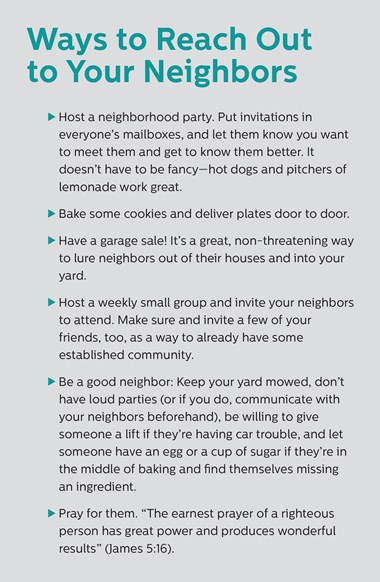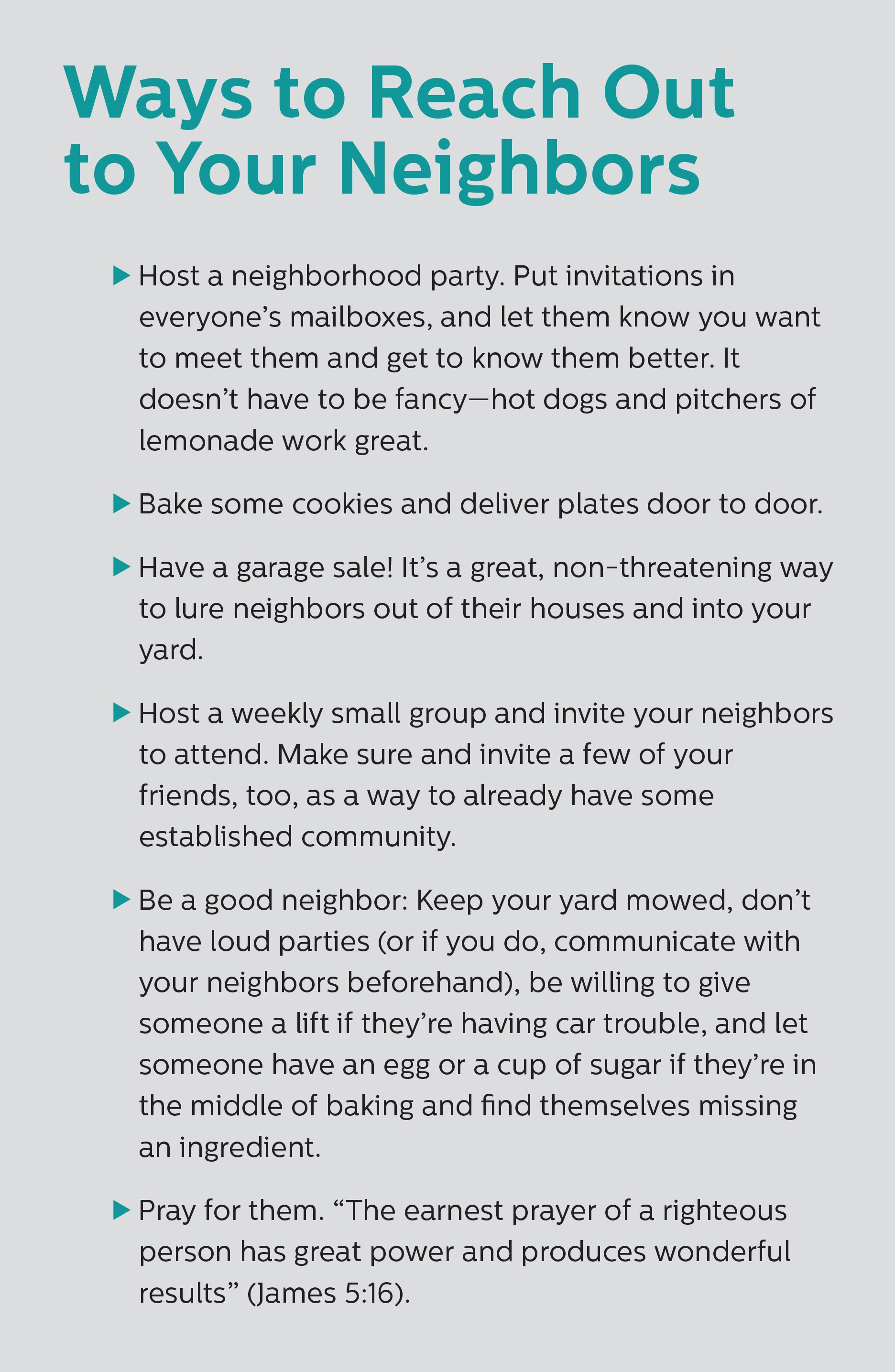
She sits on her porch steps in thin pajamas, knees up to her chest, and stares at the ground.
I wonder what she sees there.
Every day at 5:15 p.m. I pull in my driveway, the one between our houses, and slide out of my truck. I look at her, every time, but she doesn’t look at me—and I’m angry, every time, at her audacity to operate her “business” right next door. It’s not just sex she sells; it’s drugs too. She’s everything I hate about this neighborhood—this neighborhood God has called us to.
I sense the irony.
Loving the Unlovely
We moved here to “be a light,” to be the “hands and feet of Jesus,” to get out of our comfort zone and be face to face with daily opportunities to live the gospel smack dab in the middle of the hood. Seven years we’ve been here, and, honestly, it’s mostly improved. We’ve prayed over our neighborhood, beseeched God to come with his presence, and have had many opportunities to love and serve our neighbors. It’s been an amazing experience.
But then she moved in.
Lately, I’ve seen her brushing her teeth in the front yard with a cup of water. The water has been turned off for quite a while now, and I can only imagine the filth inside those four walls. I know there are bed bugs. The landlord admitted that to me the other day. And rather than being moved with compassion, I shudder as I imagine armies of tiny insects crawling over grass blades and creeping their way into our lives too. God, help us.
In my twenties, I remember talking about loving prostitutes and drug addicts in ethereal terms. I spouted off phrases like “loving the unlovely” and “Jesus was a friend of sinners,” which sounded godly and cutting-edge at the time. But now that our yards are rubbing shoulders and her clients are parking by my curb, I’m just not feeling the love.
But God is.
I do feel the conviction. Every day when I climb out of my Chevy and plod through the grass toward my house, I feel it. This knowledge that I ought to say something—ask about her day, her life—is heavy on me.
I’d like to say I don’t do much intentional sinning these days. I mean, sure, there’s the occasional disrespectful slip of the tongue when talking to my boss, or not quite telling the whole truth to my husband when he’s asking about my recent shopping trip. I pride myself (oops, there’s another one!) on being somewhat righteous these days.
But God, in his kindness that leads us to repentance, makes sure we’re not too self-confident in our own attempts at holiness with this little zinger in James: “If anyone, then, knows the good they ought to do and doesn’t do it, it is sin for them” (4:17, NIV).
Intentional Living
When our family was gathered around the breakfast table recently, my husband and I engaged in a passionate discussion with the kids about why we moved to this neighborhood. I dogmatically explained how we continually have opportunities to minister here, surrounded by brokenness and obvious need. And as I went outside to grab something from the car, I suddenly found myself face to face with . . . her.
It’s funny how God always gives us an opportunity to put our money where our mouth is. This woman I had hated from afar very politely asked if she could borrow our hose (and our water) to take a quick (swimsuit) shower in the yard. I almost turned her down with some sort of lecture about how she shouldn’t be living there without the proper utilities, ending with a stern, “Oh, by the way, we know what you’re up to, and we’re calling the cops!”

But 1 John 3:18 popped into my head—that nagging little verse that says, “Dear children, let’s not merely say that we love each other; let us show the truth by our actions.” I tried to swat it away, but it was followed by the reminder of how it’s a sin to know the good we ought to do and not do it.
God has an amazing way of refining us.
As I looked this woman in the face, the Holy Spirit prompted me to make conversation. We sat down on pieces of wood from an old lumber pile by the fence, and we talked about life.
“What did you want to be when you grew up?” I asked.
“Well, I certainly never wanted to be a drug addict,” came the frank reply.
I was halfway alarmed, halfway relieved that she was being so open about her current state. And from there, the confessions just kept coming, confirming my presuppositions, but my smugness about being right was replaced with compassion and sadness.
“My mother was a heroin addict, and she stuck a needle in my vein when I was only 11. Then she turned me out for my first trick before I even had hair on my you-know-what.”
And just like that, my walls crumbled down, my self-righteousness lying around my feet like filthy rags. I tried to encourage her that Jesus was in the rescue business, and that it might not be easy—and would probably be really, really hard—but if she wanted to be free, his arm was not too short to save. I prayed for her right there, my hand on her back, the Holy Spirit inside of me yearning for freedom for my new friend. We cried together—her at the mess she had made of her life, and me at the mess life had made for her.
My friend, Melissa. Melissa Ann. Melissa Ann, next door.
She’s moving soon, and so am I. We haven’t talked since our mid-morning encounter, but I no longer look at her house with disgust. I’m praying she walked away that day with a fresh dose of hope, just as I walked away with a fresh dose of humility.
It feels good to do the right thing, to do the good you know you should. When we’re tempted to withhold things, to stay put when we should be going forth, to be silent instead of speaking up, “God is faithful. He will not allow the temptation to be more than you can stand. When you are tempted, he will show you a way out so that you can endure” (1 Corinthians 10:13). And sometimes, that way out may walk right up to your yard and ask to borrow the water hose.
Erin Venable is a mother of five (ages 5–13) and writes country music with her singer/songwriter husband. Erin and her family are preparing to move to Cameroon via Antioch Ministries International and the Medical Centers of West Africa, where she hopes, among other things, to continue dialoguing about her beliefs and passions.
Read more articles that highlight writing by Christian women at ChristianityToday.com/Women
 Read These Next
Read These Next

 Breaking Through TogetherFor Arloa Sutter, the greatest strength of her neighborhood is her neighbors.
Breaking Through TogetherFor Arloa Sutter, the greatest strength of her neighborhood is her neighbors. Make Love LastHead-over-heels emotion gives couples a great start. But success down the road calls for something more.
Make Love LastHead-over-heels emotion gives couples a great start. But success down the road calls for something more.
 Crushed by the Pressure to Do It All?Live wild and free instead.
Crushed by the Pressure to Do It All?Live wild and free instead.








 Homepage
Homepage
